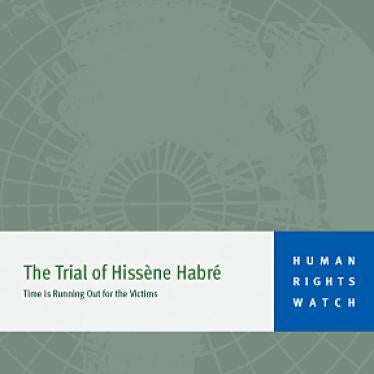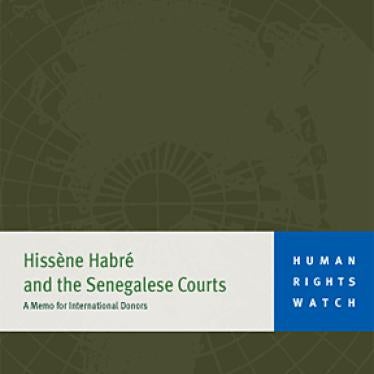(Brussels) – Six months after Senegal agreed to an African Union request that it prosecute Chad’s former dictator, it has moved very slowly in bringing Hissène Habré to trial on charges of crimes against humanity, Human Rights Watch said in a briefing paper released today.
In the paper, released ahead of an African Union summit that will review Senegal’s progress in the case, Human Rights Watch noted that Senegal had not even passed the legislation needed to try Habré. Human Rights Watch called on the AU to name a special envoy to help Senegal prepare Habré’s trial.
“Senegal can show that African courts will deliver justice to African victims for atrocities committed by African leaders,” said Reed Brody, special counsel at Human Rights Watch, who works with Habré’s victims. “But the Senegalese government has gotten off to a very slow start.”
Habré was first arrested in Senegal in February 2000 on charges of crimes against humanity and torture stemming from his 1982-1990 rule in Chad. After Senegal refused to prosecute him in 2001 or to extradite him to Belgium in 2005, Dakar on July 2, 2006 agreed to an AU decision that Habré be put on trial in Senegal. On November 2, 2006 the Senegalese government announced the establishment of a commission to prepare the trial and the revision of its laws to permit such a trial. Although Senegal’s cabinet approved a draft law in November, the assembly has not yet taken up the bill.
Habré’s victims joined Human Rights Watch in calling on Senegal to move swiftly.
“We have been fighting for 16 years to bring Hissène Habré to justice, and many survivors of his regime have died in the seven years since Habré was first arrested in Senegal,” said Ismael Hachim Abdallah, president of the Chadian Association of Victims of Political Repression and Crime (AVCRP, or Association des victimes de crimes et répressions politiques). “Unless Senegal takes action soon, there won’t be any victims left at the trial.”
In the briefing paper, Human Rights Watch noted that Senegal is now faced with the “complex and costly task of investigating and prosecuting massive crimes committed many years ago in another country.”
Human Rights Watch called on the international community to provide training and funding to assist Senegal in bringing Habré to trial. But donors should also insist on measurable political commitment from Senegal. Senegal has complained that it has not received international assistance, but Human Rights Watch noted that Senegal has not presented a plan or a budget nor made any requests for funding.
The African Union, whose summit will be held in Addis Ababa on January 29 and 30, should assist Senegal and monitor its progress by naming a special envoy for the case. A group of 12 leading African and international human rights organizations in Africa echoed this call in a letter to the African Union. On January 22, Chad’s current president, Idriss Déby Itno, also publicly called for the African Union to follow up with Senegal.
“The African Union has called on Senegal to prosecute Hissène Habré and Senegal has done very little in six months, other than establishing a commission to prepare the trial and sending a law to the National Assembly,” said Alioune Tine of the Dakar-based African Assembly for the Defense of Human Rights (RADDHO, or Rencontre Africaine pour la Défense des Droits de l'Homme). “It is the African Union’s responsibility to see that its decision is put into practice. The AU’s credibility, and that of all Africa, is at stake here.”
Background
Habré ruled the former French colony of Chad from 1982 until he was deposed in 1990 by Déby Itno and fled to Senegal. His one-party regime was marked by widespread atrocities. A 1992 Truth Commission accused Habré’s regime of some 40,000 political murders and systematic torture.
Habré was first indicted in Senegal in 2000 before courts ruled that he could not be tried there. His victims then turned to Belgium and, after a four-year investigation, a Belgian judge in September 2005 issued an international arrest warrant charging Habré with crimes against humanity, war crimes and torture committed during his 1982-90 rule. Pursuant to a Belgian extradition request, Senegalese authorities arrested Habré in November 2005.
When a Senegalese court refused to rule on the extradition request, the Senegalese government announced that it had asked the African Union to recommend “the competent jurisdiction” for Habré’s trial. On July 2, 2006, the African Union, following the recommendation of a Committee of Eminent African Jurists, called on Senegal to prosecute Habré “in the name of Africa,” and President Abdoulaye Wade of Senegal declared that Dakar would do so.







